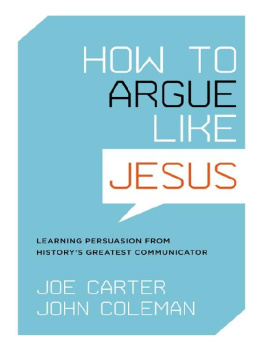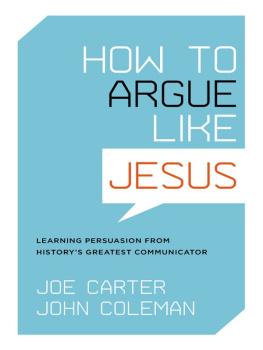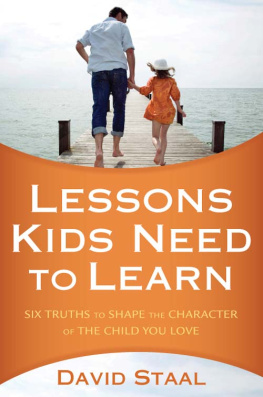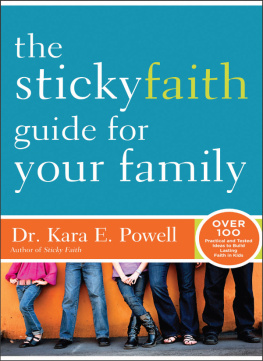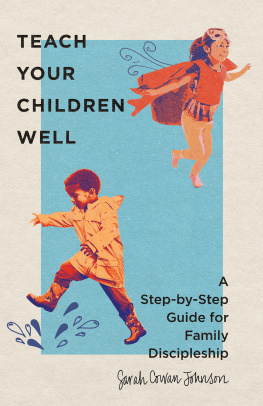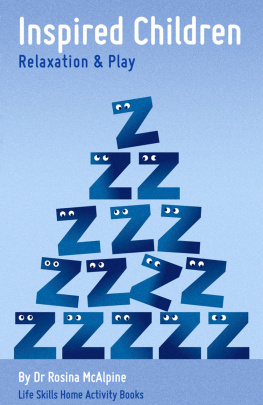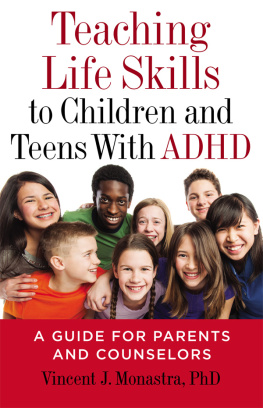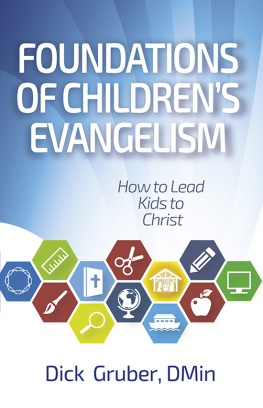Joe Carter is an editor for the Gospel Coalition, an educator, and a 15-year Marine Corps veteran. He has held several positions in the publishing field and has been cited in numerous publications, including the New York Times, the Wall Street Journal, and the Washington Post .
Are You Prepared to Talk with Your Child About...?

Discussing difficult topics with kids has never been easy, but in todays world, its more difficult than ever. Gay marriage, terrorist attacks, pornography, police shootings, and yes, sex, are just some of the complex issues children will encounter in our current culture. When your child asks questions, will you have answers?
Tough Stuff Parenting will equip you to have thoughtful, age-appropriate conversations with your child. The biblically based wisdom and practical tools youll find inside will help you confidently engage your kid in meaningful dialogue. And when questions arise, your child will look to you first for answers instead of friends or the internet.
Make a lasting connection with your kid by learning how to effectively discuss lifes most complicated topics.
A Healthy View of Sexuality Starts with God

God created sex to be good. But our culture is drifting away from a biblical worldview and is promoting an unhealthy view of sexuality. The church has taken a defensive approach, giving our kids a long list of do nots with few words of hope or redemption.
Do you want something better for your child?
Rediscover Gods plan for sexuality and instill a positive perspective of sex and identity in your children. Mom, Dad... Whats Sex? will equip you to
help your child learn what Gods Wordand todays culturesay about sex
understand the influence pop culture and social media have on your kid
share a gospel-centered, hopeful message with your son or daughter
Give your child a healthy view of sexuality grounded in biblical truthrecognizing the gift of intimacy, the reality of brokenness, and the redeeming work of the Savior.

There is perhaps no greater fear in a parents heart than the thought that a much-loved and well-cared-for child will make bad choices or even become a prodigal.
What are parents to do in such circumstances? Authors Jim Newheiser and Elyse Fitzpatrick speak from years of personal experience as both parents and biblical counselors about how hurting parents can deal with the emotional trauma of when a child goes astray. They offer concrete hope and encouragement along with positive steps parents can take even in the most negative situations.
Includes excellent advice from Dr. Laura Hendrickson regarding medicines commonly prescribed to problem children, and offers questions parents can ask pediatricians before using behavioral medications. A heartfelt and practical guide for parents.
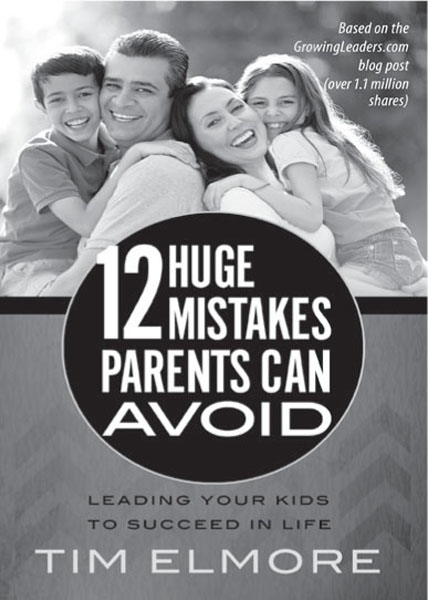
Youre deeply committed to helping your kids succeed. But youre concernedwhy are so many graduates unprepared to enter the workforce and face life on their own? Youre doing your best to raise healthy children, but sometimes you wonder, am I really helping them?
Tim Elmore shows you how to avoid twelve critical mistakes parents unintentionally make. He outlines practical and effective parenting skills so you wont fall into common traps, such as
making happiness a goal instead of a by-product
not letting kids struggle or fight for what they believe
not letting them fail or suffer consequences
lying about kids potentialand not exploring their true potential
giving them what they should earn
Find out why thousands of organizations have sought out Tim Elmore to help them develop young leadersand how you can improve your parenting skills and help your kids soar.
T his book came about because of the word whimsical. And facetious. And dj vu. And a hundred other terms my daughter had once asked me, Dad, what does this word mean?
I knew what the words meantor I thought I did. I could understand them when I saw them in a book. I could use them in a sentence. I could even spell them (most of them, anyway). But when my own child asked me what those words meant, I couldnt explain them in a way she could understand. I knew the words in a way that allowed me to function, and yet I couldnt pass on the knowledge I had acquired over a lifetime of reading and talking.
In other words, I didnt truly know those words. As the famous educator Mortimer Adler said, The person who says he knows what he thinks but cannot express it usually does not know what he thinks.
I soon realized this problem wasnt limited to vocabulary words. I also couldnt explain how to study the Bible or deal with peer pressure. I couldnt explain how to share the gospel, manage stress, or deal with bullies. I had acquired hundreds of life skills that I couldnt explain and pass along to my daughter.
No one had told me when I became a parent this would be a problem.
Maybe its not a problem for all parents. Maybe many moms and dads intuitively understand how to pass along such knowledge to their progeny. Even so, I suspect there are also a lot like me who, even if they had learned the information for themselves (which isnt a certainty), dont have the first clue about how to teach it to their own children.
By the time I figured out how to solve this problem, my daughter was already an adult. (Now I have to wait till I have grandchildren to share what I know.) Hopefully, you still have time to learn the simple process of how to learn. Once you master this technique, youll be able to teach almost any concept to your children.
Learn to Teach with the Feynman Technique
Science educator David Goodman once asked the brilliant Nobel Prizewinning physicist Richard Feynman to explain a certain puzzling phenomenon. Feynman said, Ill prepare a freshman lecture on it. But a few days later, said Goodman, Feynman came back and said, You know, I couldnt do it. I couldnt reduce it to the freshman level. That means we really dont understand it.
Notice Feynman claimed not only that he didnt genuinely understand the concept but also that the entire scientific community didnt understand the concept. He had a firm belief that once we truly understand an idea we should be able to explain it in simple terms to non-experts.
Feynman became known as the Great Explainer because he intentionally learned a subject in a way that allowed him to teach it to those who didnt share his expertise. His method is now known as the Feynman Technique and can be used to learn the key concepts behind the habits and skills in this book. This method helps you learn these concepts, retain the knowledge indefinitely, and pass on the information to your children in a way they can understand.
Here are the five steps of the Feynman Technique.
1. Pick a concept you want to understand and start studying it. First write down the concept you want to learn in a notebook. Next, do the minimal amount of reading and research necessary for you to understand what the concept is about, and then write what you think you should know about the topic in the notebook. At this stage, you dont need to waste a lot of time trying to learn everything about the topic. You only need to know the core components necessary to understand and explain the concept.
Next page

